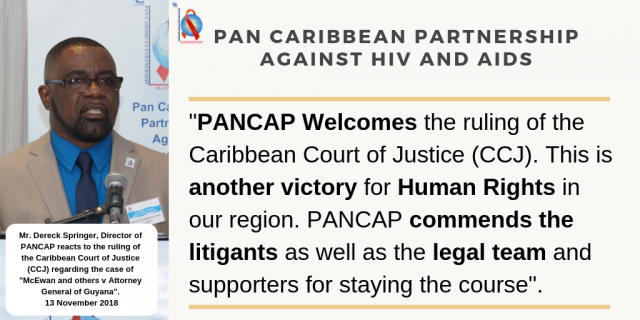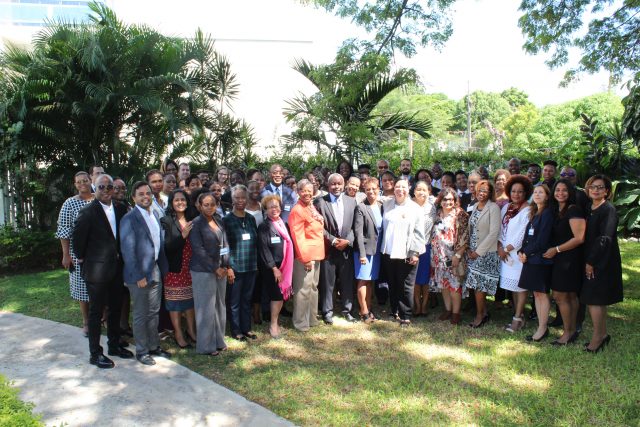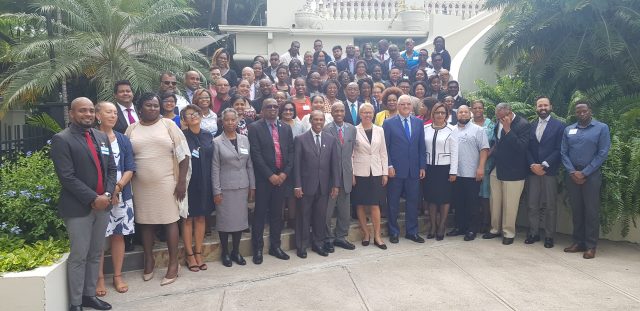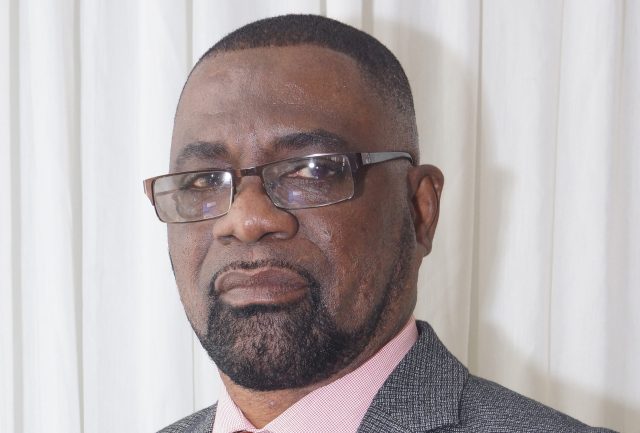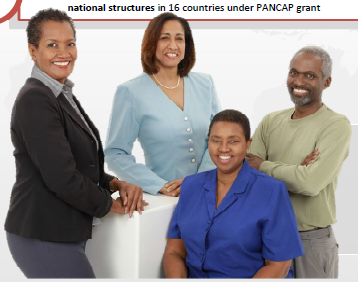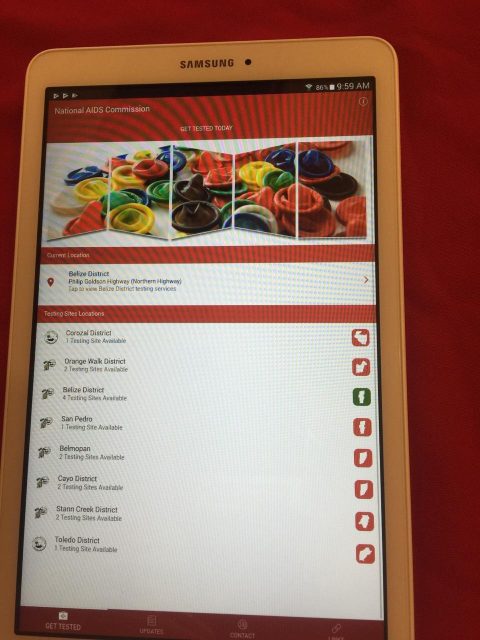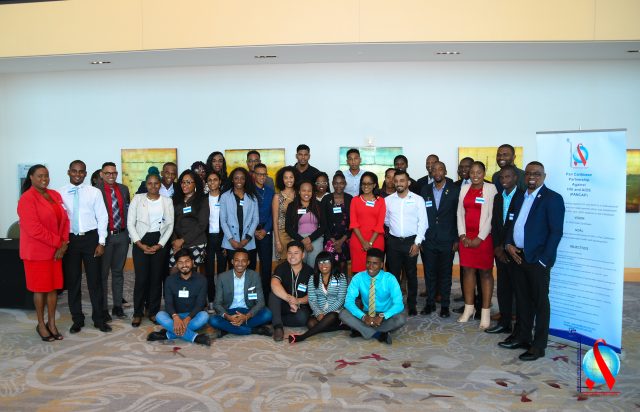Tuesday, 30 October 2018 (PANCAP Coordinating Unit, CARICOM Secretariat): The Pan-Caribbean Partnership against HIV and AIDS (PANCAP), with funding from the CARIFORUM 10th European Development Fund (EDF) Programme of Support for Wider Caribbean Cooperation commenced the Regional Meeting for Advancing Recommendations for Addressing Gaps in the Human Rights Response under the PANCAP Justice For All Programme in Kingston, Jamaica on 30 October 2018.
In opening remarks, Ambassador Malgorzata Wasilewska – European Union Representative, explained that the Regional Meeting is part of an EU funded programme of about 400,000 EUR over the period October 2017 to April 2019, which supports advocacy efforts undertaken by the PANCAP, through its “Justice for All Programme”. She highlighted that the objective of the support to PANCAP is to strengthen the coordination on Human Rights issues to reduce HIV and AIDS stigma and discrimination through structured and continuous dialogue. “This action is expected to accelerate the human rights agenda across the Wider Caribbean Region, and, more specifically to build upon the work already initiated with several stakeholders, including parliamentarians and faith leaders under the Caribbean Regional Strategic Framework on HIV and AIDS and Global Fund support”, stated Ambassador Wasilewska.
She emphasized that the European Union actively promotes and defends human rights both within its borders and when engaging in relations with non-EU countries. In Jamaica, for example, within the last 2 years, the EU Delegation has provided grant contracts valuing over 350,000 EUR to support the work of the “Jamaica AIDS Support for Life” and “Eve for Life”, both of which work with vulnerable populations to provide services that prevent HIV infections and treat with parties who have already contracted HIV.
“Concretely, the EU’s commitment to providing wide range support for work with various vulnerable groups translates into engagement in local, regional and multilateral fora and into financial supports to efforts, for example, by regional organizations to further the human rights and democracy agenda”, stated Ambassador Wasilewska.
The Ambassador stated that the Regional Meeting illustrates the EU’s commitment to support PANCAP’s efforts towards that objective, and which, by the end of the meeting, should translate into the design of a coordinated response tailor-made for the region that provides an effective and durable response to HIV in the Region.
She further stated that the event, which highlighted the results of the study funded through the EU’s support on the human rights status in the region, could not be more timely.
“Indeed, on 10 December 2018, we will be celebrating the 70th anniversary of the adoption of the Universal Declaration of Human Rights,” stated Ambassador Wasilewska, “The respect of human rights is a collective problem, and we need to come together, as you do today, to develop a collective solution. This is even more important at a time when we are witnessing too many occurrences of human rights violations all around the world”.
She further stated it was time for the world to embrace the importance of human rights. “They improve lives for millions of people; they strengthen societies and charter the path for a better collective future for humanity. Acting in their favor is acting for ourselves, for our children and future generations”.
“From a personal perspective, I speak to you today not just as an EU representative but also as a mother. My hope is that my child will live in a world that is free of HIV and in a world where the respect of human rights is not an issue any longer. Looking back at history but also the present, this hope may seem utopic but this is no reason to disengage”, stated the Ambassador.
She urged the participants to allow their discussions and actions to contribute to the achievement of eliminating stigma and discrimination associated with HIV. She emphasized that such an achievement will require a strengthened and collective resolve across all sectors of society, aimed at ensuring that zero stigma and discrimination are part of the equation for zero risk for HIV exposure.
Dr. John Edward Greene, PANCAP Advisor stated that the meeting comes at a time when the world is engaged in advancing the targets of the 2030 Sustainable Development Goals (SDGs) – reducing poverty, promoting HIV within the context of integrated health, tackling the challenges of Climate Change and building resilient communities, quality education, gender equality, social justice, among others. He stated that it was most fitting that this meeting is focusing on filling essential gaps in the human rights response as a priority of the PANCAP Justice for All Programme, which parallels the targets in SDG #16.
Dr Greene stated, “This regional meeting is indeed a celebration of the foresight of the EU and of functional cooperation, of which PANCAP is one of the clearest manifestations. But the genesis of the tenth EDF grant that supports this significant regional meeting dates back to 2001 when the EU awarded PANCAP an institutional Strengthening Grant of 10 million Euros which established the PANCAP Coordinating Unit (PCU) and through the PCU, sustainable support for core PANCAP partners — the Caribbean Epidemiology Centre (CAREC), Caribbean Health Research Council (CHRC), Joint United Nations Programme on HIV/AIDS (UNAIDS), Caribbean Regional Network of People Living with HIV and AIDS (CRN+) — and contributed to the formation of University of the West Indies, Caribbean Health Leadership Institute (CHLI) and the Organisation of Eastern Caribbean States (OECS) HIV Programme. It is to be noted that the PANCAP Model also extended to the French Caribbean Outermost Regions (FCOR) and the UK and Netherlands Overseas Countries and Territories (OCTs)”.
He explained that by paying attention to institutional strengthening the EU provided PANCAP with the building blocks for establishing a unique regional partnership comprising governments, civil society, People Living with HIV (PLHIV) and developing agencies in a governance structure that attracted support from USAID, DFID, Canada, Germany among others and leading the UN to designate PANCAP as an international best practice in 2004.
Dr Greene emphasized that this was well deserved as it was PANCAP with technical support from UNAIDS and PAHO/WHO that created history by negotiating the first ever massive 90% reduction in the price of ARVs from $12,500 to approximately $1,000 per person This agreement was signed in Barcelona in 2002 and by 2004 triggered further price reductions spare-headed by the Clinton Foundation that joined PANCAP.
Dr Greene highlighted that the 10th EDF Wider Caribbean Cooperation Programme was proposed at the Clovis Beauregard Seminar on Regional Cooperation in the Caribbean (November 2005). It was agreed that task forces would be established in the areas of natural disaster management, HIV and AIDS, trade and investment and interconnection. These task forces were established and have had varying levels of success.
He congratulated Dereck Springer, the PANCAP Director, for his “creative leadership in marshaling PANCAP Policy and Strategy Working Group on Stigma and Discrimination (PSWG) to take corrective action by providing oversight for the implementation of the PANCAP Justice for All and Human Rights Roadmap”.
Dr Greene stated that he was enthusiastic about collaborating with the PANCAP Director in implementing The PANCAP JFA Roadmap, which he referred to as a living document that builds on and advances the aforementioned initiatives. He explained that since its inauguration in 2014 it has established national faith leaders and parliamentarians’ networks for sustaining their respective responses. “PANCAP has created a multi-stakeholders framework of faith leaders, parliamentarians, civil society, Youth, Key populations including LGBTI, and has initiated a series of national and regional forums,” stated Dr Greene.
He stated that the meeting continues the vital work of facilitating collaboration between key populations and stakeholders. “This initiative provides parliamentarians with support for their representational, legislative, and oversight roles; Faith leaders networks are being bolstered to advance contributions to ending AIDS and increasingly PLHIV and Key populations are playing a collaborative rather than a combative role in the collective advocacy for the elimination of stigma and discrimination and achieving health for all” highlighted Dr Greene.
He emphasized that this is the impetus on which the 10th EDF aims to build. He explained that the project provides an opportunity for key stakeholders to collaborate and take action to eliminate stigma and discrimination.
He urged the participants to use the meeting to develop a mantra for JFA and key actions that can be implemented to protect human rights and social justice in the region. “Let us move toward celebrating the 70th anniversary of the Declaration of Human Rights on 10 December by ensuring that this consultation helps this region to make Human Rights for All a reality,” concluded Dr Greene.
Dr Douglas Slater, Assistant Secretary-General, Human and Social Development, CARICOM Secretariat highlighted that advocacy by People Living with and affected by HIV has been critical to the progress made in response to HIV since the beginning of the epidemic. “Advocacy has sparked action in the face of denialism and indifference, mobilized unprecedented financial resources and enabled communities to participate in designing health services that meet their needs,” stated Dr. Slater.
He emphasized that in the future, advocacy remains crucial to driving sufficient resources, addressing the needs of the people most affected, and holding governments and funders accountable for the concrete results that will lead to ending AIDS as a public health threat.
Dr Slater further highlighted that during the latter part of 2017, PANCAP partners developed a Regional Advocacy Strategy and Plan to guide a coordinated approach to advocacy. He stated that “PANCAP is in a unique position to drive a regional approach to advocacy for several reasons: the demonstrated added value of regional public goods and services to support national-level efforts; a track record in developing and rolling out high quality pilot interventions; capacity to mobilize resources in ways unavailable to individual countries; the broad-based nature of the partnership and engagement of stakeholders across sectors; capacity for managing and coordinating multi-country initiatives; and evidence of the willingness of leaders and policymakers to participate in regional efforts that seek to address difficult issues”.
Dr. Slater explained that a regional approach can leverage demonstrated success in individual countries to catalyze efforts throughout the Region, and this is particularly valuable where it is difficult for national governments to address sensitive issues. He also highlighted that PANCAP’S close relationship to the CARICOM Secretariat provides a good vantage point for aligning with other regional strategies and for shared access to technical expertise and capacity building at the institutional as well as at the individual levels.
In his keynote address, Hon. Delroy Chuck, Minister of Justice, Jamaica, stated that the promotion, protection, and enhancement of Human Rights in Jamaica is a primary consideration of the current Government. “To this extent all fundamental rights are guaranteed by the Constitution and they will be upheld” stated Minister Chuck, “However, we must be aware that from time to time there are challenges, even when there are safeguards and this Government will not sit on its laurels and allow these fundamental rights to be breached”.
The Minister emphasized that if these fundamental rights are breached, the law provides for the Office of the Public Defender to take action in a Court of Law.
“At the same time we acknowledge that there are other rights which have been declared in other international arenas such as the European Union, United Nations and the Inter-American Commission on Human Rights to name a few”, stated Minister Chuck, “As is well known, many of these rights are not protected by our Constitution and as such they are controversial within the Jamaica context. This makes the approach in dealing with various human rights issues a difficult one”.
The Minister utilized his keynote address to provide the latest update on what is being done by his Ministry to deal with the issue of human rights, protecting the fundamental rights of all Jamaicans, as well as building upon the work already initiated with various stakeholders.
He stated that the foundation has already been laid for the establishment of a Human Rights Institute. He emphasized that the Charter of Rights, which provides more comprehensive protection for the fundamental rights of Jamaicans, was passed in the Jamaican Parliament.
“The Human Rights Institute will serve to ensure that as we navigate the challenges of our changing society, the rights and freedoms of citizens will always be protected,” stated Minister Chuck.
He further emphasized that “the Jamaican Government will not falter in its commitment to ensuring that the human rights of all Jamaicans are protected. We do so, fully recognizing the besetting challenges due to capacity constraints. For this reason, we continue to attach high importance to the support of our many bilateral and multilateral partners, who have offered technical and other assistance in enhancing national capacities to meet obligations in areas where constraints are often most significant”.
The Regional Meeting will continue tomorrow, 31 October and is expected to result in a number of outcomes which will empower parliamentarians to advocate for the rights of vulnerable populations and to advance the regional human rights agenda within the context of the PANCAP Justice for All Programme with an emphasis on justice systems reform.
– ENDS –
What is PANCAP?
PANCAP is a Caribbean regional partnership of governments, regional civil society organizations, regional institutions and organizations, bilateral and multilateral agencies and contributing donor partners which was established on 14 February 2001. PANCAP provides a structured and unified approach to the Caribbean’s response to the HIV epidemic, coordinates the response through the Caribbean Regional Strategic Framework on HIV and AIDS to maximize efficient use of resources and increase impact, mobilizes resources and build capacity of partners.
– 10th European Development Fund (EDF) Programme of Support for Wider Caribbean Cooperation
Under the 10th (EDF) Programme of Support for Wider Caribbean Cooperation, PANCAP will strengthen coordination on human rights issues in keeping with the Justice For all Roadmap through the HIV and AIDS Thematic Task Force in CARIFORUM.
– CARIFORUM
CARIFORUM refers to the Grouping of Caribbean States, which are signatories of the Georgetown Agreement establishing the African, Caribbean and Pacific Group of States (ACP). The ACP grouping is composed of 79 African, Caribbean and Pacific states.
CARIFORUM is the recipient of and manages the implementation of Caribbean Regional Indicative Programmes financed by the EDF and Caribbean regional programmes financed by individual Member States of the European Union. It also provides technical assistance to agencies/institutions implementing projects under these programmes.
– European Union
The Member States of the European Union have decided to link together their expertise, resources and destinies. Together, they have built a zone of stability, democracy and sustainable development whilst maintaining cultural diversity, tolerance and individual freedoms. The European Union is committed to sharing its achievements and its values with countries and peoples beyond its borders.
Background to the PANCAP Justice for All (JFA) Roadmap
The PANCAP Justice for All (JFA) Programme was established in September 2013 as a regional response to the UN High-Level Political Declaration (June 2011) designed to reduce AIDS-related stigma and discrimination. The objectives of the JFA Roadmap are:
Enhancing family life and focusing on those in need
Increasing access to treatment and affordable medicines
Reducing gender inequality including violence against women, girls and adolescents
Promoting prevention with special reference to sexual and reproductive health and rights including age-appropriate sexual education
Implementing legislative reforms for modifying AIDS-related stigma and discrimination
Helpful links:
PANCAP Justice for All (JFA) programme – https://pancap.org/what-we-do/justice-for-all/
10th European Development Fund Project (EDF) – https://pancap.org/pancap-work/10th-european-development-fund-project/
Event web page – https://pancap.org/pancap-events/joint-regional-meeting-to-facilitate-knowledge-sharing-for-advancing-implementation-of-commitments-made-under-the-justice-for-all-programme/

